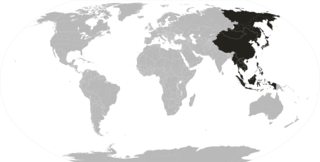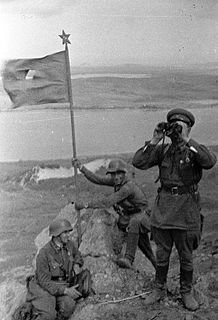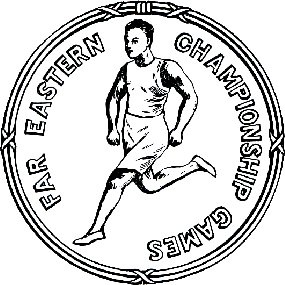Related Research Articles

The Far East is a geographical region that includes East and Southeast Asia as well as the Russian Far East. South Asia is sometimes also included for economic and cultural reasons. The term "Far East" came into use in European geopolitical discourse in the 12th century, denoting the Far East as the "farthest" of the three "easts", beyond the Near East and the Middle East. Likewise, in Qing Dynasty of the 19th and early 20th centuries the term "Tàixī (泰西)" – i.e., anything further west than the Arab world – was used to refer to the Western countries.

The Asian Games, also known as Asiad, is a continental multi-sport event held every four years among athletes from all over Asia. The Games were regulated by the Asian Games Federation (AGF) from the first Games in New Delhi, India, until the 1978 Games. Since the 1982 Games, they have been organized by the Olympic Council of Asia (OCA), after the breakup of the Asian Games Federation. The Games are recognized by the International Olympic Committee (IOC) and are described as the second largest multi-sport event after the Olympic Games.

The 1940 Summer Olympics, officially known as the Games of the XII Olympiad, were originally scheduled to be held from September 21 to October 6, 1940, in Tokyo, Japan. They were rescheduled for Helsinki, Finland, to be held from July 20 to August 4, 1940, due to the 1937 Japanese invasion of China, but were cancelled due to the outbreak of World War II. Helsinki and Tokyo eventually hosted the 1952 and 1964 Summer Olympics respectively.

Not to be confused with Far East region of Asia

The China national football team represents the People's Republic of China in international association football and is governed by the Chinese Football Association.

The 1951 Asian Games, officially known as the First Asian Games, was a multi-sport event celebrated in New Delhi, India from 4 to 11 March 1951. The Games received names like First Asiad and 1951 Asiad. A total of 489 athletes representing 11 Asian National Olympic Committees (NOCs) participated in 57 events from eight sports and discipline. The Games was the successor of the Far Eastern Games and the revival of the Western Asiatic Games. The 1951 Asiad were originally scheduled to be held in 1950, but postponed until 1951 due to delays in preparations. On 13 February 1949, the Asian Games Federation was formally established in Delhi, with Delhi unanimously announced as the first host city of the Asian Games.

The Soviet invasion of Manchuria, formally known as the Manchurian strategic offensive operation or simply the Manchurian operation, began on 9 August 1945 with the Soviet invasion of the Japanese puppet state of Manchukuo. It was the largest campaign of the 1945 Soviet–Japanese War, which resumed hostilities between the Union of Soviet Socialist Republics and the Empire of Japan after almost six years of peace. Since 1983, the operation has sometimes been called Operation August Storm after U.S. Army historian David Glantz used this title for a paper on the subject.

The Battle of Lake Khasan, also known as the Changkufeng Incident in China and Japan, was an attempted military incursion by Manchukuo, a Japanese puppet state, into the territory claimed and controlled by the Soviet Union. That incursion was founded in the Japanese belief that the Soviet Union had misinterpreted the demarcation of the boundary based on the Treaty of Peking between Imperial Russia and Qing China and the subsequent supplementary agreements on demarcation and tampered with the demarcation markers. Japanese forces occupied the disputed area but withdrew after heavy fighting and a diplomatic settlement.
The Far Eastern Front was a front — a level of military formation that is equivalent to army group — of the Soviet Army during the Russian Civil War and the Second World War.
The 1934 Far Eastern Championship Games was the tenth edition of the regional multi-sport event, contested between China, Japan and the Philippines, and was held from 16 to 20 May in Manila, the Philippines. A total of eight sports were contested during the four-day competition. The Dutch East Indies (Indonesia) participated at the games, becoming only the second nation outside of the traditional three to send a delegation to the event. The games were held at the then newly built sports complex, Rizal Memorial Field which was constructed on the former site of the Manila Carnival Grounds.

The Far Eastern Championship Games was an Asian multi-sport event considered to be a precursor to the Asian Games.

Dionisio "Chito" Calvo was a Filipino basketball player, swimmer, and coach who mentored both the basketball and football national teams of the Philippines. He was one of the greatest Filipino sportsmen in history and helped in the development of both Philippine and Asian basketball.

Lee Wai Tong was a Chinese international association football player, head coach, and former Vice President of FIFA. He is often regarded as the greatest Chinese footballer due to his accomplishments in winning several Far Eastern Games titles with the national team as well as captaining the national football squad to their first ever Olympic tournament in 1936, which was held in Berlin. This was also followed by having an extremely successful club career with South China where he won eight league titles with them, helping to establish the club as the most successful team in Hong Kong history at the time. After his retirement, he moved into management where he guided Republic of China to win the 1954 Asian Games.
Athletics is an Asian Games event since 1951 in New Delhi, India. Among major athletics tournaments of the region, it succeeded the athletics at the Far Eastern Championship Games, which had ceased to be held after 1938.

The Rizal Memorial Baseball Stadium is a baseball stadium located inside the Rizal Memorial Sports Complex in Manila, Philippines. It has a seating capacity of 10,000.

East Asia is the eastern region of Asia, which is defined in both geographical and ethno-cultural terms. The modern states of East Asia include China, Japan, Mongolia, North Korea, South Korea, and Taiwan. China, North Korea, South Korea and Taiwan are all unrecognized by at least one other East Asian state due to severe ongoing political tensions in the region, specifically the division of Korea and the political status of Taiwan. Hong Kong and Macau, two small coastal quasi-dependent territories located in the south of China, are officially highly autonomous but are under de jure Chinese sovereignty. Siberia borders East Asia's north, Southeast Asia the south, South Asia the southwest and Central Asia the west. To the east is the Pacific Ocean and to the southeast is Micronesia.
Shigemaru Takenokoshi was a Japanese football player, manager, and referee. He played for Japan national team. He also managed Japan national team.

Elwood Stanley Brown was an American sports organizer in Illinois, Manila, Europe, and South America. In his short life, he made a number of major accomplishments: the intensive promotion of sports among Filipinos, originating international sports competitions in Asia, the promotion of the Olympics around the world, the founding (1910) of the first Boy Scout troops in the Philippines, and initiating and organizing the American Expeditionary Forces games and its corollary the Inter-Allied Games at the end of the War in Europe.
Events from the year 1917 in Japan. It corresponds to Taishō 6 (大正6年) in the Japanese calendar.
Athletics was one of the sports at the biennial Far Eastern Championship Games. Athletics competitions were held at every one of the ten editions of the games, which existed between 1913 and 1934. This represented the first time that a regular major international athletics competition occurred between Asian nations. It was later succeeded by athletics at the Asian Games, which began in 1951.
References
- ↑ Fan Hong, "Prologue: The Origin of the Asian Games," Sport, Nationalism and Orientalism Archived February 11, 2012, at the Wayback Machine